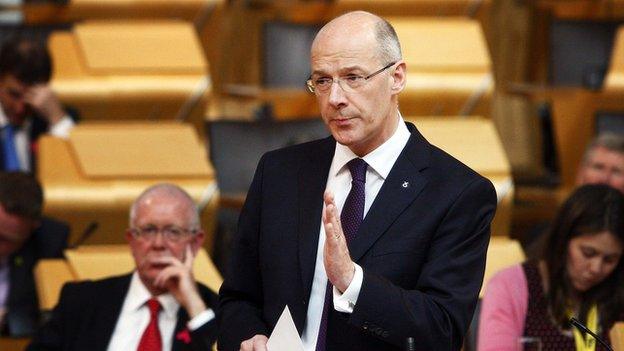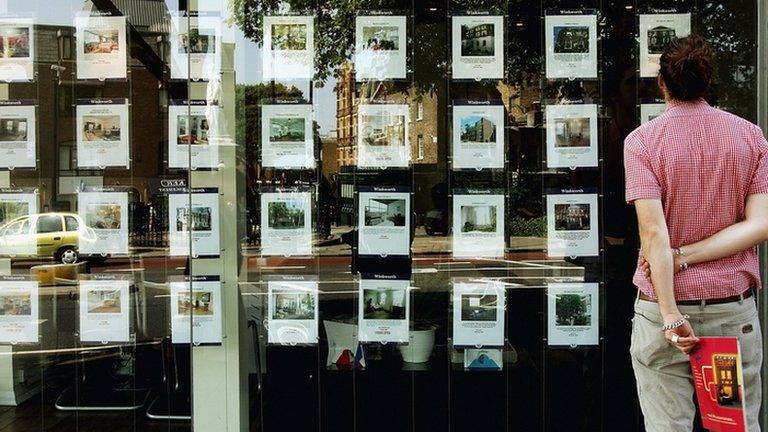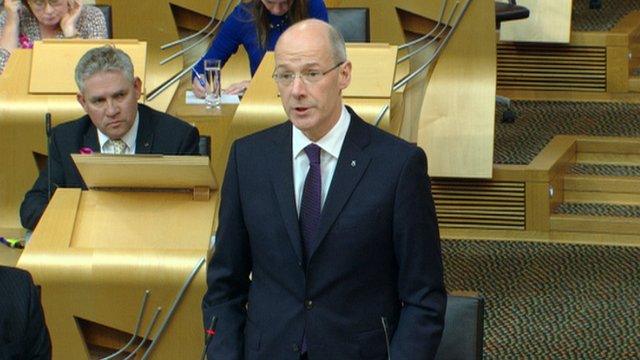Scottish Budget: The reaction in quotes
- Published

Scottish Finance Secretary John Swinney set out new taxes in the draft budget 2015-16
The Scottish Finance Secretary John Swinney has presented his plan for the budget.
This is the first budget in which the Scottish Finance Secretary has been able to decide tax rates. Mr Swinney announced the rates of two new devolved taxes, the Land and Buildings Transaction Tax, which will replace Stamp Duty, and the Scottish Landfill Tax.
He said homebuyers in Scotland would pay no tax on properties costing less than £135,000. Under the new Land and Building Transaction Tax, a tax of 2% will apply to transactions between £135,000 and £250,000, while a 10% rate will apply to those between £250,000 and £1m and 12% above £1m.
Iain Gray, Scottish Labour finance spokesman
"Scottish Labour welcomes any attempts to introduce a more graduated replacement to stamp duty.
"This budget demonstrates once and for all that we have a powerful devolved parliament in Holyrood, just as the people of Scotland democratically, decisively and emphatically chose to remain within the UK just three short weeks ago.
"However, what we have seen is that Mr Swinney's successive budgets have failed to protect our NHS. The reality is that health spending in Scotland has not kept pace with spending in England and we know Scottish Government plans are being worked on for £450 million in cuts."
Willie Rennie, Scottish Liberal Democrat leader
"There is still a great deal to be done to ensure that this budget delivers for families, with new investment to ensure that childcare provision in Scotland matches what Liberal Democrats have secured in other parts of the country.
"We need to see action to restore college funding to 2011 levels, so more young people can get the best start in life, and on mental health so that these crucial services get the investment they need."
Gavin Brown, Conservative finance spokesperson
"This is another example of the SNP lurching to the left. It's not a mansion tax. A family buying a house worth £325,000 would be hit - homes of various types, and even some flats, will be subject to the rise. It's not just going to hit the wealthy, it's also a suburbs tax that will impact many ordinary middle class families.
"This isn't about people in their 50s and 60s who have already found their family home and settled. It's going the overwhelm people from their late 20s to early 40s, who are thinking about starting or adding to their family. They need to think about a suitable home to raise their children, they need to think about schooling.
"With this huge hike in tax, for thousands of those people that aspiration has become impossible because of the much heavier price tag. This move will also distort the market. There will be a rush of people looking to sell their homes before this incredible rate kicks in, and far fewer after April."
David Lonsdale, director, Scottish Retail Consortium
"Retailers contribute over a quarter of all revenues from business rates in Scotland. The decision to ensure the poundage rate rises no faster than that which applies in England and confirmation that the £95 million larger retailer levy will be scrapped next Spring are, therefore, both positive and welcome.
"Business rates are set to generate £2.8 billion in tax revenues next year, up from £2.1 billion just five years ago. A comprehensive longer term overhaul of the rates system is required, which would increase retailers' confidence about investing in property, create more jobs and help revive high streets."
Paul Brewer, head of government and public sector at PwC in Scotland
"We welcome the continued focus on infrastructure investment to underpin Scotland's future economic growth. The commitment of £125 million to the housing sector, which includes housing associations and low cost housing providers, will be welcomed and, alongside the £135,000 threshold before the new property tax regime kicks in, will undoubtedly benefit young people and those on low wages who are keen to get on the property ladder.
"It is to be hoped that, as the debate over further devolved powers reaches its conclusions, we'll see further targeted investment focused on making Scotland an attractive business location with the transport, digital and housing infrastructure that encourages the private sector to invest."
Graeme Brown, director of Shelter Scotland
"Ahead of this announcement we called on the Finance Secretary to invest an additional £200 million in a budget for homes in order to start tackling Scotland's housing crisis.
"While £125 million of additional funds is welcome, the commitment to deliver only 4,000 social rented homes is a missed opportunity and shows the Scottish Government's ambition falls well short of meeting the expectations of 150,500 people stuck on council house waiting lists. To bring real hope to these families and individuals, we need to deliver at least 10,000 social rented homes a year."
Grahame Smith, Scottish Trades Union Congress (STUC) general secretary
"Today's budget provides little relief for hard pressed public service workers who have seen their real terms income falling by thousands of pounds in recent years. STUC reiterates its support for the continuing Living Wage commitments within Public Sector pay policy but is very concerned about the squeeze on those on median pay of a little over £21,000 per year which is getting more and more painful every year.
"These real terms wage cuts are a disaster for our members and a disaster for the Scottish economy which desperately needs a boost in demand."
Peter Kelly, director of the Poverty Alliance
"Scotland is a vastly unequal country, with the three richest families owning the same wealth as the bottom twenty per cent. Across Glasgow alone, there is a life expectancy gap of eleven years between those in the most deprived areas and those in the most affluent communities. We welcome measures to tackle this inequality, and particularly increased funding to tackle child poverty and to mitigate against the impact of welfare reform."
Philip Hogg, chief executive, Homes for Scotland
"With all home purchases under £325,000 set to 'win' under the new system, the plans set out by Swinney have the potential to support an active housing market. However, we are yet to fully assess the impact that an increased tax take from higher value homes, and an increase in tax charged on land purchases, in meeting the Scottish government's desire to be revenue neutral, will have on home building businesses."
Mary Taylor, chief executive, Scottish Federation of Housing Associations
The additional boost referred to in the budget statement of £125m in financial support to the housing sector is welcome and we look forward to the detail of how this extra subsidy is to be allocated between new social rented homes, where the greatest need exists, and low-cost home ownership and market-rate initiatives. However, with more support to the sector, much more could be achieved towards achieving the government's housing completion targets."
Jim Hillan, tax partner, CMS law firm
The Scottish budget statement makes the point that non-residential Land and Buildings Transaction Tax will be cheaper than the old Stamp Duty Land Tax for transactions up to around £2m. However, transactions of major strategic importance for businesses regularly weigh-in at more than that, and, on a £50m acquisition, the tax bill goes up by almost £250,000. There may be an assumption that large transactions can support a larger tax bill - that may not always be the case."
Andrew Perratt, head of residential in Scotland for estate agents Savills
"Young families who need to live in the prime hubs of Edinburgh, Aberdeenshire and Glasgow's west end, where average house prices are considerably higher, the proposed increases are so punitive they may discourage many buyers from moving. In view of this we anticipate increased market activity between now and the spring, whereby buyers are likely to make quick and committed decisions before the new tax comes into force in April."
- Published9 October 2014

- Published9 October 2014
